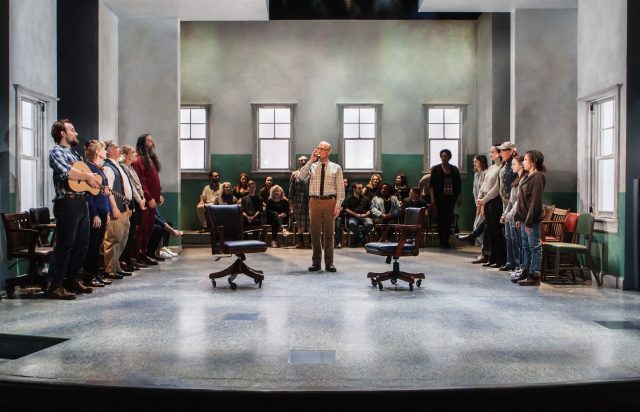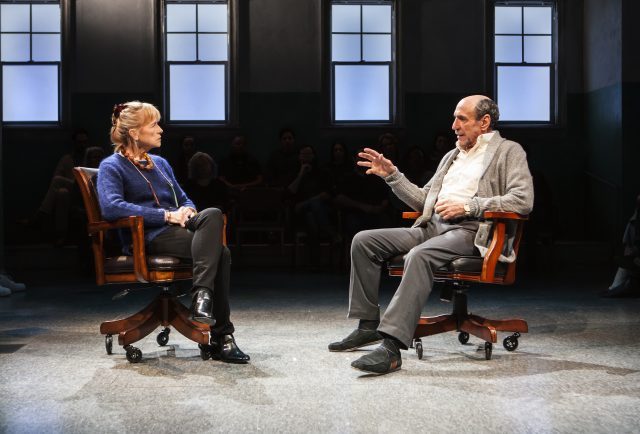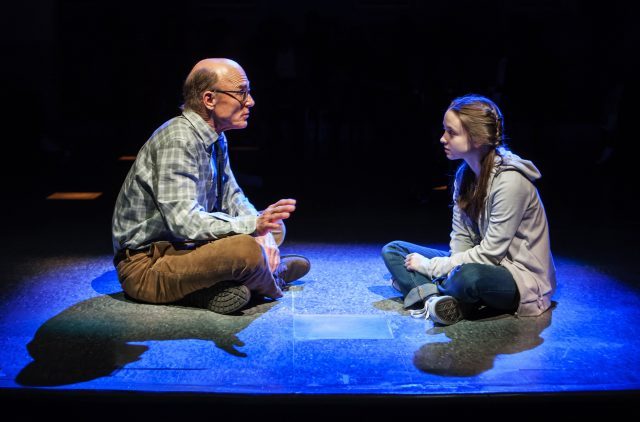
Dr. Robert Michaels (Ed Harris) calls everyone to order in New Group production of David Rabe’s Good for Otto (photo by Monique Carboni)
The New Group at the Pershing Square Signature Center
The Alice Griffin Jewel Box Theatre
480 West 42nd St. between between Ninth & Tenth Aves.
Tuesday – Sunday through April 15, $40 – $125
www.thenewgroup.org
Right from the start, Tony-winning playwright David Rabe and director Scott Elliott make everyone in the Alice Griffin Jewel Box Theatre at the Pershing Square Signature Center equal in the New York premiere of Good for Otto. After the audience is seated and the doors are closed, several people enter the stage from the rear and sit in either one row of freestanding, umatched chairs on either side or two rows of fixed seats in the back. It’s a combination of the cast and audience members, sitting next to one another, with no separation. For the next briskly paced three hours, actors get up, share their joys and anxieties (mostly the latter) with one of two therapists at the Northwood Mental Health Center in the fictional town of Harrington near the Berkshire Mountains, then return to their seat. The central figure, part conductor, part stage manager a la Thornton Wilder’s Our Town, is Dr. Robert Michaels (a sweetly charming Ed Harris), a calm, good-natured psychiatrist who runs the clinic. He’s a poetic, positive-thinking counselor who explains in the beginning, “In spite of the bucolic countryside, in spite of the sky, the trails, the lakes, pain is plentiful here. Twenty-first century Americans in the land of plenty. But there’s money problems; family and work pressure. Autism. O.C.D. Alcohol and drug abuse, sexual abuse. Being young. Getting old. It all sits hidden in our little world of bright skies, bright lakes, and tall trees. And then finally, of course, there’s simply and always the problem of being human.” Dr. Michaels and his colleague, therapist Evangeline Ryder (Amy Madigan, Harris’s real-life wife), see patients who have trouble relating to others, whether they be friends, family (especially mothers), or strangers, while feeling out of place in contemporary society.

Evangeline Ryder (Amy Madigan) and Barnard (F. Murray Abraham) conduct a session in New York premiere of David Rabe play (photo by Monique Carboni)
Timothy (Mark Linn-Baker) is a grown man who is a little too close to his pet hamster, the palindromic Otto. Jane (Kate Buddeke) can’t get over the horror of her son Jimmy’s (Michael Rabe, the playwright’s son) suicide. Barnard (F. Murray Abraham) is a married septuagenarian who would rather not get out of bed every day. Alex (Maulik Pancholy) is a young man trying to come to terms with his homosexuality. Frannie (Rileigh McDonald) is an abused teenage girl with a storm inside her and considering a new life with her foster mother, Nora (Rhea Perlman), who is afraid that both of them are already too broken. And Jerome (Kenny Mellman of Kiki and Herb) is a piano-playing hipster drowning in boxes and a mother (Laura Esterman) who doesn’t understand him. Meanwhile, Dr. Michaels has his own issues, often seeing and talking to his mother (Charlotte Hope), who killed herself when he was nine; he knows it’s all in his head, but he can’t stop it. A dedicated and caring therapist, he also has trouble with boundaries. “You can’t get involved,” Evangeline tells him. “Your feelings — my feelings — our baggage — we can’t let it leak into the work.”

Dr. Michaels (Ed Harris) and Frannie (Rileigh McDonald) discuss parents and trolls in psychodrama at the Signature (photo by Monique Carboni)
In his fourth work produced by the New Group, following Hurlyburly, An Early History of Fire, and Sticks and Bones, Rabe is not digging deep into Sigmund Freud territory but merely exploring what ails everyone. “So many thoughts in our heads. In each of our heads,” Dr. Michaels’s mother explains. “Thoughts racing around, over each other, under each other. Thoughts hiding thoughts. Thoughts hunting for other thoughts that are hiding from the thoughts hunting them. And all of them doing it all at once. My goodness. What a madhouse.” The madhouse is inside us as we watch various characters deliver long monologues — and the rest of the excellent cast, which also includes Lily Gladstone as Denise, the clinic secretary, and Nancy Giles as Marcy, an insurance company case manager, watches as well. Oscar and Obie winner Abraham (Homeland, Amadeus) brings a Shakespearean flair to the proceedings, while Linn-Baker (My Favorite Year, On the Twentieth Century) balances humor and fear as the autistic man-child Timothy. Dr. Michaels’s penchant for singing old songs, which he introduces by playing a pitch pipe, feels frivolous, but otherwise Good for Otto hits its mark. Rabe (In the Boom Boom Room, Streamers) was inspired by Richard O’Connor’s 1997 book, Undoing Depression, which begins: “The essential question that patients and therapists ask themselves over and over is: why is it so hard to get better.” It is clear from the start that Good for Otto is not about anyone getting better. It’s about the pain of being human and the little quirks and imperfections we all have, from patients and doctors to actors and theatergoers, as we keep spinning our wheels like metaphorical hamsters in psychological cages.